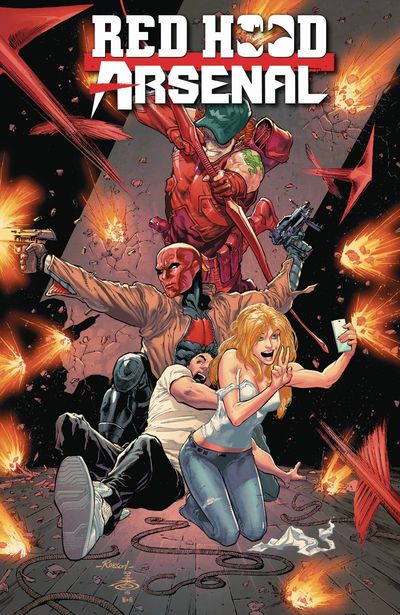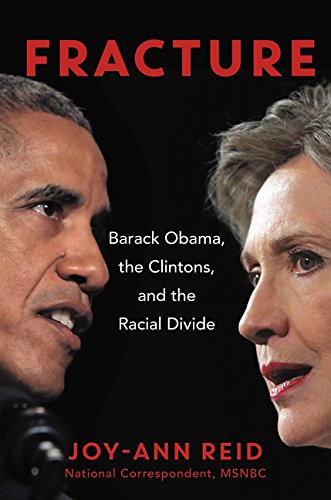 |
| [ GOING OUT WITH A BARGAIN! ] |
TO QUOTE Charles Dickens: “The pain is parting is nothing to the joy of meeting again”.
THE REVIEW:
At the start of this issue we see Jay using one of Roy’s most outrageous inventions to quickly dispatch the Iron Rule -- one by one -- until only Bea remains. Terrified by the fate of her companions she hastily decides to free Roy and plead for his mercy. Unfortunately, Jason is not having any of that, forcing Roy to intervene.
Thankfully, Roy manages to successfully talk Jason down, despite JD still holding Tara hostage and presenting Jason with a painful choice: Kill her or let Tara die. So if Jason kills Duela he proves that he’s no different to her, yet if he lets Tara die then he will prove he is no hero.
What will Jason’s choice be?
Unlike RHATO, Lobdell clearly had more time to properly set up the ending of this series and it shows too. JD’s arc has been slowly building up over the past seven issues, and while there’s still some plot threads that go somewhat neglected, the payoff is more than enough to make up for that particular pitfall.
See, the ending of both RHATO and RH/A is about Jason growing as a character and moving past his old anti-hero roots. When the New 52 started Jason and Roy had reached rock bottom: Shunned by the people they considered family and were without friends. They had committed themselves to a dangerous lifestyle that would only end with their deaths. Luckily for us, they found each other (along with Starfire) and they helped each other to overcome their past and strive together towards a better and brighter future. Unfortunately Starfire left the boys a while back, but that only helped to strengthen their friendship. As long as they were together, they could take on anything the world might throw at them.
This prompted a massive change in Jason’s worldviews, for all of his bravado and snide remarks; he actually suffers from very low self-esteem. There’s no one who believes more than himself that he is a failure, however, being with Roy has brought a glimmer of hope to his life. If someone was able to remain by his side and be a true friend, then maybe, Jason wasn’t a failure.
So eager to prove himself worthy of Roy’s friendship Jason started making progress towards becoming a full-fledged hero, going so far as to try to redeem every foe they came across instead of killing them. When they met JD, Jason knew she was his final trial. As just like him, she was tainted by the Joker, and if he were able to successfully rehabilitate her, then he could put to rest his doubts about himself for good.
As we all know, this blew up in Jason’s face and nearly got Roy and Tara killed at the hand of the Iron Rule, shaking Jason to his core, making him question everything he believed in. Despite his best efforts JD was irreversibly rotten, and if she couldn’t be redeemed, would that mean the same thing for him?
Worse yet, thousands of innocent bystanders wanted to see Roy die just because they could, because they were bored. The same people he and Roy worked so hard to protect turned on them when they needed them the most. For someone as pragmatic as Jason, this was a mortal blow to his faith in other people. Clearly they didn’t deserve to be saved nor protected.
Roy on the other hand never lost hope, never lost his faith in people even when they unanimously voted for his death. Furthermore, he was also able to find a third option to JD’s riddle: Disabling her without killing her, and this was a solution that Jason was never able to consider.
Faced with this fact Jason realized that Roy was always the better man, a true hero all the way through, and that as long he would remain as Jason's pal, he would’ve never be able to realize his full potential. Even if Jason truly wished to continue at Roy’s side, he has grown enough as a person to realize he must put Roy’s well-being before his, leading to a painful end of their friendship. This way Roy will be able to shine even brighter in the company of other heroes like him, while Jason will be able to slip into the darkness, fighting evil in the only way he knows how.
Speaking of Roy, I was afraid their break up would stem from him finding Jason’s actions disgusting or too extreme. But Lobdell once again managed to surprise me. While Roy did object at Jason’s brutality, he was quick to forgive him, more worried about losing potential clients than anything else. Thus, as you expect, proving himself as being a true friend for Jason until the bitter end. This made his separation even more painful to read: While Roy would also wish to continue at Jason’s side, he realizes that is something they both have to want to work at, so even if he’s hurt by Jason’s choice he has no other option but to respect his wishes and move on.
This time around Duela and the Iron Rule are nothing more than plot devices to advance the story, and while the Iron Rule ending is an interesting idea that wasn’t properly explored, Lobdell gives JD an absolute stellar role. Using her as a dark counterpart for Jason is brilliant in its simplicity and makes me wonder why no one else thought of it before. For the first time since his resurrection Jason has someone he can call a nemesis, an ironic twist considering the dynamic their “parents” already have. Lobdell’s work is even more impressive because he managed to build JD into a credible villain in only six issues, something that no other writer had been able to do with the character since her introduction more than two years ago.
Since character focused stories are Lobdell’s forte it shouldn’t be a surprise to anyone that this story is easily his best work yet. Lobdell managed to write editorial’s mandate to dissolve the title’s partnership in a organic and poignant manner: One that reads like the logical end for it given recent plot developments.
The plot also presents a pretty interesting Meta commentary regarding Jason’s standing in the world of fandom. As I explained before, Lobdell has tried since the start of the N52 to push Jason into a new direction, moving him away from his anti-hero roots and into a more distinctive role. However, with the commercial failure of the DCYOU initiative, DC has decided to return to the most popular and fondly remembered iterations of its characters, bouncing Jason back into the anti-hero role.
With this in mind, Jason’s diatribe about the audience’s bloodthirst and his statement about not being able to be the hero Roy wanted him to be take on a whole new meaning. People have been quick to realize the similarities between Lobdell’s approach to Morrison’s work back in his original Batman & Robin run. Personally I think Lobdell’s take is the better of the two, because while Morrison was more about making a criticism of the anti-hero as a concept, it felt disconnected with the story. Jason is turned into a mere mouthpiece for Morrison and thus his characterization clashes with the (admittedly poorly explored) direction he had before and fails to leave a definitive mark in the overarching plot, becoming nothing more as an interesting curiosity on the larger picture, just obliquely referenced here and there.
Lobdell’s take on the other hand is intrinsically tied with his plot, becoming a major element for the boys’ characterization and one that molds their direction moving forward into the DCU’s Rebirth. This scenario also offers a more than needed chance for Jason to call the audience out on their detachment and morbid interest in seeing him suffer in the original Death in the Family. Jason shutting down the broadcast with a bullet after saying his piece is a scene that will stick out in the reader’s memory for a long time.
In an unusual move, Lobdell caps the story with a small backup telling the first meeting between Jason and Roy, but with the added detail of the whole sequence being told (and drawn) in the style of the golden age comics from yesteryear.
The whole thing is so bright and happy it's easy to tear up at the contrast it has with the boys’ final meeting, creating a very poignant bookend of sorts for Jason and Roy’s adventures together in the N52. Both stories’ are meant to be read as a whole but the shift between them is a little abrupt and easily lending itself to some confusion among readers, making them miss all the subtleties Lobdell packed on those pages; a small lead-in (some dialogue, a fade-in, anything really) connecting both narratives would’ve been enough to fix it. Regardless of this flaw, I do believe it's a great way to end the series.
Joe Bennett is once again in charge of the visuals and I’m pleased to say he does an excellent job at it. Since his style favors detailed and expressive faces, it mixes perfectly with Lobdell’s script, where the characters’ emotions are more important than bombastic action scenes or unique panel layouts. However, the biggest proof of Bennett’s skill is the backup story. For this five page tale he shifts his style completely, going from reasonably realistic strokes to a goofy and cartoony style very reminiscent of the golden age of comics. Honestly, if the book didn’t credit just one artist for this issue I wouldn’t believe it was Bennett’s work from start to finish.
Jose Villarubia remains as the colorist as well and has grown pretty comfortable with Bennett, delivering some somber colors for the main story that adequately set the gloomy mood, then bright and solid colors for the small backup feature. Definitely his best episode in the series.
THE MUSIC:
The nurturing friendship between Jason and Roy has finally come to an abrupt end at the five year mark. So while there’s a chance for the boys to meet again in the future, their break up is still a bitter and sad event. This is why the only song I found fitting for this issue is Friend is a Four Letter Word by Cake. Their melancholic lyrics expressing perfectly my sadness at this pair going their separate ways.
THE COMPARISON:
Roy and Jason’s friendship has endured disappointments, the parting of a good friend, arguments, and even monetary issues. But as we all know, even the sturdiest unions can break down after a while, and their friendship is no exception. What started out like a little crack has grown into a huge Fracture that ultimately destroyed their friendship, leaving the boys to pick up the pieces and move on with only the memories of their time together, keeping them company.
THE CONCLUSION:
Whether you liked the series or not, it can’t be argued that this story presents the first major change to the boys’ status quo in five years, therefore making this issue a fundamental piece for both Jason and Roy. If you have the slightest interest in these characters, then you can’t let this issue pass.
*** This review was brought to you by Adan, Comic Lad Extraordinaire.
RED HOOD / ARSENAL #13
 Reviewed by David Andrews
on
June 27, 2016
Rating:
Reviewed by David Andrews
on
June 27, 2016
Rating:
 Reviewed by David Andrews
on
June 27, 2016
Rating:
Reviewed by David Andrews
on
June 27, 2016
Rating:











No comments: